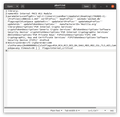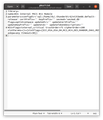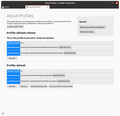
Saving Old Mail Data When Migrating To Linux From Windows . . .
Today I moved from Windows 10 to Ubuntu 20.04, in part on the back of assurance got from reading this recentish thread on saving old mail data when on Windows and later re-activating it once Ubuntu was installed:
https://superuser.com/questions/1550634/moving-thunderbird-email-setup-from-win10-to-linux-ubuntu
Trouble is, I cannot ¨see" any sign of the old mail folders and mail accounts after following the above procedure. Of course, I can re-create the existing mail accounts and start with empty mailboxes - but I don want to lose all my emails since 2006.
I tried searching through your forums archives for advice on this migration - which must be common with developers who need a Linux distro on their work machine - but found nothing so far.
Any suggestions welcome.
Всички отговори (20)
Did you Quit Thunderbird BEFORE copying your old profile folder on Windows and BEFORE pasting its contents in Tbird's new profile in Linux?
I think so. That was the procedure and I followed it. For sure, the entire SDD contents (Win 10 plus all apps & data) were deleted before Ubuntu was installed on the SDD.
You can see .default file here
https://www. downloads.browngate.com
if you apply:
User: reader Password: $0d0wn (0 = zero)
Double-click on the folder name to drill down into sub-folders and files.
Променено на
You have to be sure that that is exactly what you did. There is no room for guessing. The slightest deviation in following published instructions can and will result in a different outcome, so do it all over again then provide the exact steps you followed in your next reply. That's the only way we can "see" what you're doing.
I can't do it all over again. The SSD was reformatted after all data files of use were copied to either media or web server storage. My copied .default file is here:
https://downloads.browngate.com
User: reader Password: $0d0wn [ 0 = zero ]
Double-click on the .default file to drill down into sub-folders and files.
To see the actual .default folder go here
https://www.downloads.browngate.com
and log in using
user: reader password: $0d0wn [ 0 = zero ]
Double-click on the .default folder to drill into its components.
(I'm trusting that the .default folder was copied after closing TB on Windows and/or that it makes no difference to the contents of .default)
Did it all again according to the procedure with one difference - I deleted the pkcs11.txt file that holds a location for the existing mail accounts according to this thread
https://askubuntu.com/questions/1084914/thunderbird-not-saving-passwords-on-ubuntu-18-04
Screenshots attached.
On reopening, there is nothing like a Local Folders stack showing all folders for various mail accounts, etc. This is no big surprise, since the details of the accounts no longer can be got from pkcs11.txt. But I have refrained from filling in these since I fear that this new version of Thunderbird may create separate sets of folders for each mail account. This might clash with the data in .default which largely had all accounts sharing the Sent, Drafts, Junk and Trash folders and having a separate (named) Inbox for each.
I wish I knew the process sequence for Thunderbird when it opens . . .
The simple way around this is.
open Thunderbird and navigate to the troubleshooting information on the hep menu. click the show button for the profile folder. Shut down Thunderbird. Copy the contents of your .default folder (not the default folder. So expect lots of replace dialogs) over the content in the existing profile folder that opened in windows file manager
Open Thunderbird again to use the existing profile with the old data copied in.
Copy the contents of your .default folder (not the default folder. So expect lots of replace dialogs) over the content in the existing profile folder that opened in windows file manager . . .
Just to be clear, I follow the previous procedure subject to:
1. Removing pkcs11.txt file from old .default folder (As it points to a dead Win 10 referenced location) 2. NOT updating the profiles.ini file with a new .default filename
Do not share or post sensitive information in public forums. Anyone viewing this page can download your entire Thunderbird data using the username and password you provided above! Change that password ASAP.
I don't bother with the profiles.ini file. My procedure is as follows:
1. Open the new profile folder, Quit TB and delete everything from this folder, rendering it empty. 2. Copy the contents of the old profile folder to the empty new profile folder. 3. Delete the pkcs11.txt file 4. Launch Thunderbird.
The pkcs11.txt file gets recreated with the correct contents when TB starts. The new profile path is already correctly recorded in the profiles.ini file, so no need to modify the file manually. This works for me each time on Windows, Mac and Linux.
Not working.
After re-opening TB following adding the old .default folder contents to the new .default folder, it imports NO DATA - no account data, no Local Folders division, no address book, no nothing. Naturally, it then asks the user to add a user account. When I add a valid user account (the first and main one that must be detailed elaborately within the old mail data) it just treats it as an entirely new email account . . .
I don't know what trials you have made with this procedure but it seems that something is still missing here. I note that the new pkcs11.txt file is no longer placed in the .default folder but in the .default-release file.
Променено на
The new .default folder should actually be ending with .default-release. Go to Help -> Troubleshooting Information -> about:profiles and see how many profiles are listed there. Open the profile folder for the profile in use using the corresponding button. Is that the same folder you copied the old profile folder's contents to? I can't even begin to count how many times I've followed this procedure in Mac, Linux and Windows, and between different TB versions, as part of my routine investigation of support issues. I honestly don't know what else to tell you. There is no missing step in those I gave earlier. The only thing I can think of is you're not copying to the right profile folder.
An alternative approach, is to create a new profile and point it to the old profile folder. This automatically takes care of updating the profiles.ini file. Just make sure to delete the pkcs11.txt file before launching the new profile. See Profile Manager - Create and remove Thunderbird profiles
Променено на
No, I copied the old .default folder contents to the new .default folder. You reckon I should have put them into the .default-release folder ?
Attached is a shot of the about:config profiles - it's clear that the Profile In Use is from the .default-release folder.
tamjk said
You reckon I should have put them into the .default-release folder ?
I started by providing you a way to access the location thunderbird is using for your profile folder via troubleshooting information. I suggest you use it to place the information in the folder the program will find it in.
Odd as it might sound fighting what the software thinks it knows about where your profile folder is simply makes the process you use not work.
Started over again after clearing all data from previous installation, removing TB and the reinstalling it. Put old TB data (minus pkcs11.txt file) from .default file into the new .default-release file. Reopened and now get this message (see screenshot attached) about old versions and compatibility. Attach also a view of the profiles.ini and installs.ini files.
Променено на
This means the TB data was last used by a higher version of Thunderbird than what you are currently running. Inside the profile folder, there is a compatibility.ini file that says which version of TB was used. That's the version you should install and use OR higher.
Thanks.
The compatibility.ini file shows: [Compatibility] LastVersion=68.12.1_20200929010218/20200929010218 LastOSABI=WINNT_x86-msvc LastPlatformDir=C:\Program Files (x86)\Mozilla Thunderbird LastAppDir=C:\Program Files (x86)\Mozilla Thunderbird
My terminal shows:
tk@tk-Inspiron-5567:~$ thunderbird --version
Thunderbird 68.10.0
tk@tk-Inspiron-5567:~$
So itś 68.10 installed in Ubuntu with data coming from 68.12 in Win 10.
I have tried installing TB with snap and this provides a higher version with a new look. But whenever I do this and go to Help > Troubleshoot and then try clicking on the Open Profile button, nothing happens. So I could not implement the procedure with the newest versions.
The available versions (see screenshot attached) jump from 68.10 to 78.0 . . .
Not sure where to go for a 68.12 version.
Just rooted out this from the archives
http://archive.mozilla.org/pub/thunderbird/releases/68.12.0/linux-x86_64/en-GB/
Will try tomorrow.
Променено на
Always download Thunderbird from the official website here https://thunderbird.net for the latest version OR http://archive.mozilla.org/pub/thunderbird/releases/ for older versions. You need 68.12.1 to match the TB data.
Found TB v68.12.1 on above linked webpage. Extracted on downloads folder and started by double-clicking on thunderbird/thunderbird file. Then followed the procedure as before, putting my old .default folder contents into the new .default-release folder. On reopening thunderbird, I see the desired old mail folders show up plus the calendar add-on. While all email since 2006 are restored to all other folders, I only see emails from 2008 to 2011 in my main inbox for the principal email account plus the few from 2020 that were downloaded from my web server on opening TB successfully today. See attached screenshot. All other things like address book entries and so on seem intact. I wonder if somehow an inbox file is partly missing from my old mail data ? Or if this absence of mails from 2006 - 2008 and 20011 - 2020 is due to the fact that I changed from Outlook Express to Thunderbird in mid 2008 ? At mid 2008 I successfully migrated my Outlook Express mails to my new TB installation. Likewise when I migrated from one Windows machine to another in 2017.
Променено на
No response to my last post's query on whether something is wrong with my old mail data files or if the migration process is faulty . . . Maybe it can be raised as a separate post ?
Finally, I was just looking at the procedure for migrating to Linux here
https://support.mozilla.org/en-US/kb/profiles-where-thunderbird-stores-user-data
In the light of my recent experience vis-a-vis .default-release folder and pkcs11.txt file, it would save similar issues being raised here in future if administrators amended this procedure.
Thanks again to Stans & Matt for sorting this thing out for me.













